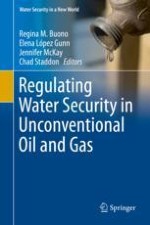2020 | OriginalPaper | Chapter
3. The Human Right to Water and Unconventional Energy
Authors : Robert Palmer, Damien Short, Ted Auch
Published in: Regulating Water Security in Unconventional Oil and Gas
Publisher: Springer International Publishing
Activate our intelligent search to find suitable subject content or patents.
Select sections of text to find matching patents with Artificial Intelligence. powered by
Select sections of text to find additional relevant content using AI-assisted search. powered by
